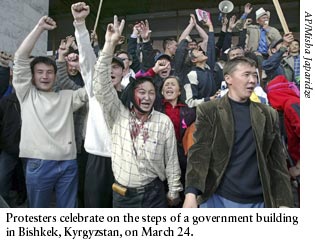New York, March 25, 2005—At least one Kyrgyz journalist was hospitalized with injuries and another arrested as police tried to break up the escalating unrest that prompted President Askar Akayev to flee the country this week. The demonstrations, which toppled yet another authoritarian regime in Central Asia, came amid widespread anger over fraud-marred parliamentary elections—and weeks of government censorship, harassment, and obstruction of the press.
The head of the country’s independent Journalists Trade Union, Azamat Kalman, suffered two broken legs on Wednesday after he was beaten by police officers dispersing protests in the capital, Bishkek, and then pushed off a 10-foot-high ledge by Akayev supporters. Kuban Mambetaliyev, head of the Bishkek-based press freedom group Journalists, said Kalman was still hospitalized today but was recovering.
Police also arrested Bolotbek Maripov, a journalist with the newspaper Obshchestveny Reiting (Societal Approval), along with some 20 protesters. He was released on Thursday. The same day, television crews from Moscow-based stations REN-TV and Moskoviya were roughed up and had equipment stolen by looters who did not want to be filmed.
Akayev and his family were in neighboring Kazakhstan today, the Russian news agency Interfax said. The president denied he had resigned, calling the reports “malicious lies,” the ITAR-Tass news agency reported. But clearly he was on the run after protests had swelled over irregularities in parliamentary elections that began in late February.
“Today the situation is OK,” Mambetaliyev said, describing improving security conditions. “Journalists are working and filming and there are a lot of foreign journalists in town.”
State media had been virtually silent on the unrest until Thursday. Senior government officials had preventing journalists at the state-run Kyrgyz National Television & Radio Corporation (KTR) from reporting on rallies protesting the conduct of the vote, according to local and international press reports.
As opposition activists stormed government buildings on Thursday, Kyrgyz state television broadcast nature programs. Two journalists and one opposition leader did appear on a state television news program later Thursday, urging calm and saying they would start reporting on events because KTR management had fled during the protests.
To that point, the failure of the state broadcaster to report on the demonstrations had angered protesters, who attacked KTR journalists in turn. “During the demonstrations and disturbances in the south, the [protesters] simply drove away the KTR journalists, breaking their expensive digital cameras,” said Ernis Mamyrkanov, head of the non-governmental Osh Media Center, according to the London-based Institute for War & Peace Reporting.
On Tuesday, local media reported that some 90 journalists working for KTR sent a letter to managers protesting the censorship. At the same time, government officials obstructed or shuttered sources of independent news, according to local news reports. Mambetaliyev’s group reported that officials at Kyrgyz State National University in Bishkek prevented students from getting copies of the opposition newspaper MSN and that a state printer was refusing to publish the independent newspaper Tribuna (Tribune), which reports on human rights abuses.
A number of independent and opposition news Web sites experienced technical difficulties in recent weeks, raising suspicions that Kyrgyz security agents were blocking reporting on growing anti-government protests, the Moscow-based radio station Ekho Moskvy has reported.
Background
As the 2005 parliamentary and presidential elections approached, Akayev and his allies used restrictive laws and politicized government agencies to crack down on opposition voices and the country’s few remaining independent media outlets. The Central Election Commission amended election law in January to bar foreign media from publishing or broadcasting “agitation” and “election propaganda”—terms it did not define but left open for prosecution.
The move broadened the commission’s ability to restrict election coverage by radio services such as the BBC and the U.S. government–funded Radio Free Europe/Radio Liberty (RFE/RL), as well as by publications such as Moscow’s Moskovsky Komsomolets (The Moscow Komsomol), Argumenty i Fakty (Arguments and Facts), and Rossiiskaya Gazeta (The Russian Gazette).
Government officials filed dozens of politically motivated criminal and civil defamation lawsuits against journalists and media outlets in an effort to silence critics, according to the Bishkek-based Public Association of Journalists. Kyrgyzstan’s obedient courts, whose judges are appointed on the recommendation of the president, consistently convicted journalists of insulting the honor and dignity of government officials. Hefty financial penalties in these cases encouraged widespread self-censorship.
On February 24, a state broadcast regulator shuttered the popular Kyrgyz Service of Radio Free Europe/Radio Liberty, known locally as Radio Azattyk, just three days ahead of the first round of parliamentary voting. The popular station’s national reach and its willingness to criticize government officials made it particularly important to rural audiences who have little other access to independent sources of news, according to local reports.
